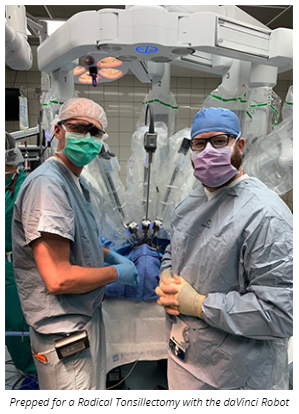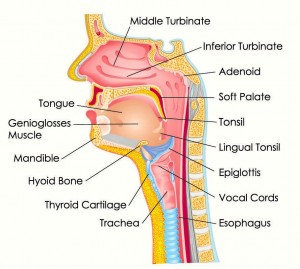What an ENT Doctor Recommends for Managing Snoring and Sleep Apnea
What an ENT Doctor Recommends for Managing Snoring and Sleep Apnea
Blog Article
Checking out the Field of Otolaryngology: What to Anticipate When You Speak With an ENT
Otolaryngology, commonly referred to as ENT, incorporates the medical diagnosis and therapy of throat, nose, and ear problems. For those experiencing associated concerns, seeking advice from an ENT professional can provide clearness and relief. Understanding what to anticipate throughout such consultations is important for reliable interaction and treatment. This review will describe essential facets of the ENT experience, including typical factors for check outs and the processes associated with diagnosis and treatment.

Understanding Otolaryngology: A Review
Otolaryngology, often referred to as ENT (Throat, nose, and ear) medicine, is a specialized branch of medication that concentrates on the diagnosis and treatment of problems affecting these essential areas of the human body. This field encompasses a large range of disorders, including those associated to hearing, balance, breathing function, and speech. Otolaryngologists are trained to manage both surgical and medical treatments, using advanced techniques and innovations. Their proficiency expands past typical ailments, attending to concerns such as allergic reactions, sinus infections, and hearing loss. Furthermore, they play a vital function in the management of head and neck cancers cells, giving extensive treatment customized to private person needs. In general, otolaryngology continues to be necessary for preserving health and lifestyle in affected individuals.
Common Reasons to See an ENT Professional
Several individuals look for the proficiency of an ENT professional for a range of factors, showing the diverse nature of conditions that affect the throat, nose, and ear. Common problems consist of persistent sinus problems, which typically leads to consistent nasal blockage and face pain. Allergies and their connected signs and symptoms, such as sneezing and itching, also motivate check outs to these professionals (Hearing). Hearing loss, whether abrupt or progressive, is an additional considerable factor for consultation. Furthermore, people might seek assessment for throat conditions, including persistent hoarseness or ingesting problems. Sleep apnea, defined by disturbed breathing throughout sleep, is frequently resolved by ENT specialists. Each of these problems highlights the importance of specialized care in handling intricate ENT-related health and wellness issues
Getting ready for Your ENT Appointment
When getting ready for an ENT appointment, it is vital to collect appropriate details and take into consideration any type of particular worries. Individuals should assemble a thorough clinical history, including previous ear, nose, or throat concerns, surgical procedures, and existing medications. Recording signs and symptoms-- such as frequency, extent, and period-- can provide valuable insights for the ENT specialist. In addition, individuals must prepare a list of concerns they desire to ask, guaranteeing that all worries are addressed during the browse through. Bringing along any relevant medical documents or test results can additionally aid the ENT in understanding the client's condition. Lastly, clients must verify their consultation information, consisting of time, place, and day, to minimize any kind of final confusion. Proper preparation can improve the effectiveness of the consultation and lead to far better results.
What to Anticipate Throughout the Assessment
As the assessment starts, the client can expect to take part in a detailed conversation with the ENT specialist about their signs and symptoms and case history. The specialist will certainly inquire about the period, frequency, and intensity of signs such as hearing loss, nasal congestion, or aching throat. Additionally, the individual's previous clinical conditions, drugs, and any type of relevant family history will certainly be reviewed, aiding the expert in developing a full understanding of the client's health and wellness. The ENT may also ask concerning you could try this out lifestyle elements, such as direct exposure to irritants or irritants. This open dialogue develops a foundation for the assessment, making certain that the person's concerns are attended to and establishing the phase for any type of necessary examinations or recommendations for therapy.
Diagnostic Examinations and Treatments in Otolaryngology
A range of analysis examinations and treatments are crucial in otolaryngology to properly examine and detect conditions affecting the nose, throat, and ear. Common tests include audiometry, which determines hearing feature, and tympanometry, analyzing middle ear pressure. Nasal endoscopy enables visualization of the nasal flows and sinuses, while laryngoscopy examines the throat and vocal cords. Imaging techniques, such as CT scans and MRIs, supply thorough views of head and neck structures. Allergy screening may likewise be performed to recognize triggers for sinus or respiratory issues. These diagnostic devices allow ENT professionals to develop a comprehensive understanding of patients' problems, making sure tailored and efficient management plans. Appropriate diagnosis is crucial for effective therapy end results in otolaryngology.
Therapy Options Used by ENT Specialists
ENT experts provide a range of treatment alternatives tailored to resolve certain conditions impacting the ear, nose, and throat. These therapies official source range from conventional strategies, such as medication and way of living modifications, to even more invasive procedures. Allergies may be handled with antihistamines or immunotherapy, while persistent sinusitis could need nasal corticosteroids or sinus surgery. For hearing loss, ENT professionals often suggest listening devices or surgical treatments like cochlear implants. In situations of throat disorders, alternatives can include speech therapy or surgeries to eliminate blockages. Additionally, they might give advice for taking care of rest apnea, including making use of CPAP tools or surgical treatments. Overall, the goal is to enhance people' quality of life with personalized care and reliable therapy strategies.
When to Look For Follow-Up Care With an ENT
When to look for follow-up care with an ENT specialist is vital for handling continuous symptoms or problems related to ear, throat, and nose problems, acknowledging. People must take into consideration setting up a follow-up visit if signs continue despite initial therapy, such as chronic ear pain, nasal congestion, or throat discomfort. Modifications in hearing, equilibrium problems, or unusual nasal discharge may additionally require more analysis. In addition, if a patient experiences negative effects from prescribed medications or has undergone a surgical treatment, follow-up treatment is necessary to monitor healing and address any type of issues. Prompt appointments can ensure effective monitoring of conditions, prevent potential difficulties, and provide satisfaction relating to one's health. Looking for follow-up treatment advertises proactive health monitoring in otolaryngology.
Often Asked Concerns

What Credentials Should I Look for in an ENT Professional?
When seeking an ENT expert, one must seek board certification, pertinent experience, and solid person evaluations. In addition, effective communication abilities and a compassionate approach can significantly boost the overall treatment over here experience.
How Do I Pick the Right ENT for My Demands?
Choosing the ideal ENT professional entails reviewing their certifications, experience, and person evaluations (Hearing). It is necessary to contemplate their interaction design and technique to treatment, ensuring they line up with the person's specific wellness demands and choices
Are There Any Risks Connected With ENT Procedures?
The dangers connected with ENT procedures may consist of infection, blood loss, anesthesia issues, and potential damages to surrounding frameworks. Individuals need to review these risks with their physician to comprehend specific issues and guarantee informed choices.
How Can I Handle Anxiety Before My ENT Consultation?
To handle anxiousness before an appointment, individuals can exercise deep breathing exercises, visualize positive end results, prepare inquiries in advance, and look for assistance from pals or family, promoting a sense of peace of mind and peace.
What Should I Do if I Experience Adverse Effects From Therapy?
If negative effects from therapy take place, the person should without delay report them to their health care service provider. Adjustments to therapy or additional interventions might be required to assure security and effectiveness in managing their condition - Otolaryngology. As the examination starts, the individual can anticipate to engage in a thorough conversation with the ENT expert about their signs and symptoms and medical history. These diagnostic tools enable ENT specialists to create a detailed understanding of patients' conditions, ensuring tailored and effective monitoring strategies. ENT experts provide a range of treatment options tailored to attend to particular problems impacting the ear, nose, and throat. When looking for an ENT professional, one should look for board certification, appropriate experience, and solid client reviews. Selecting the ideal ENT specialist entails evaluating their certifications, experience, and individual evaluations
Report this page